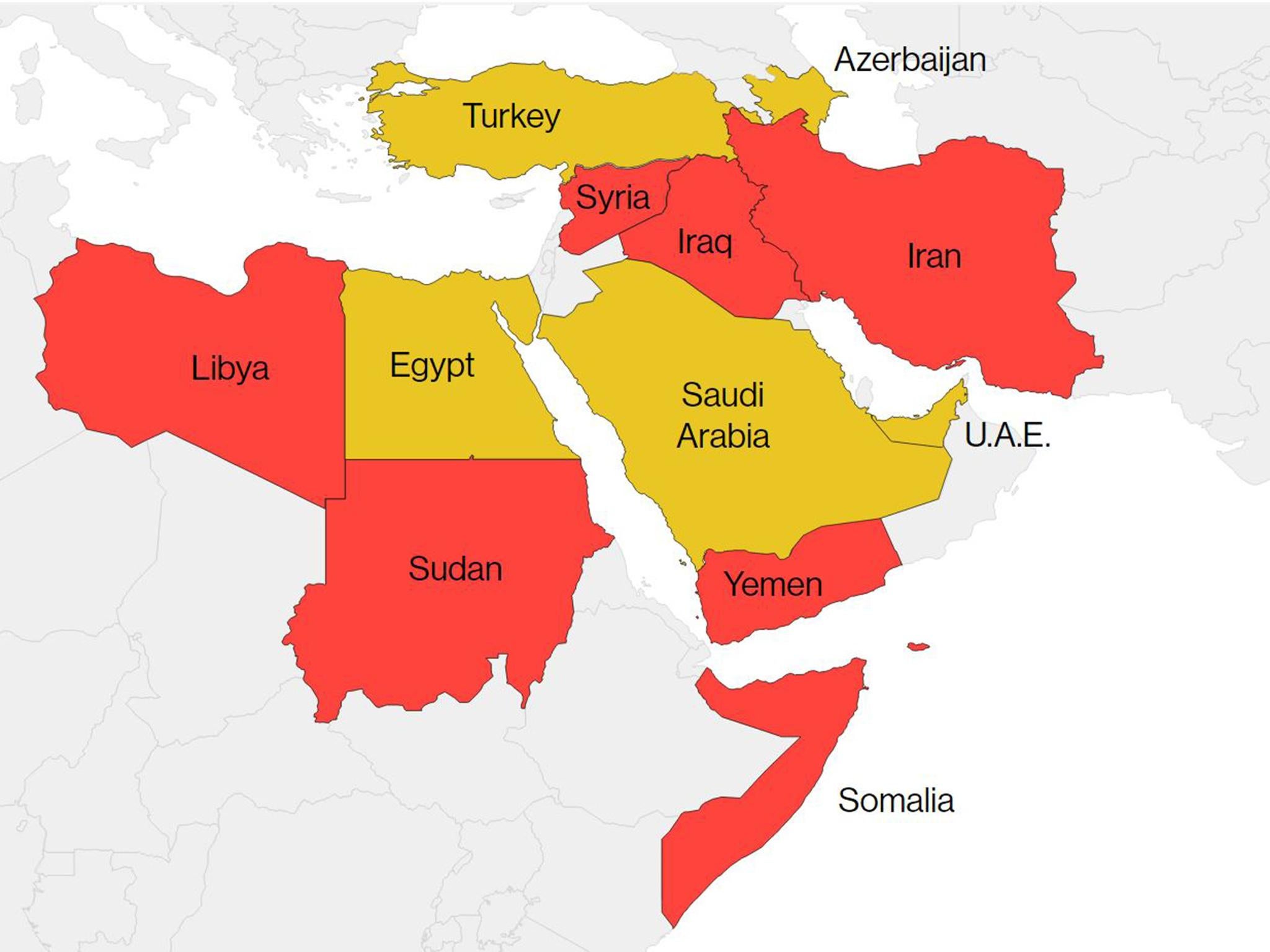Donald Trump’s immigration ban hits Muslim-majority countries (except those linked to his business)
President mulling ‘extreme vetting’ process for some migrants

Your support helps us to tell the story
From reproductive rights to climate change to Big Tech, The Independent is on the ground when the story is developing. Whether it's investigating the financials of Elon Musk's pro-Trump PAC or producing our latest documentary, 'The A Word', which shines a light on the American women fighting for reproductive rights, we know how important it is to parse out the facts from the messaging.
At such a critical moment in US history, we need reporters on the ground. Your donation allows us to keep sending journalists to speak to both sides of the story.
The Independent is trusted by Americans across the entire political spectrum. And unlike many other quality news outlets, we choose not to lock Americans out of our reporting and analysis with paywalls. We believe quality journalism should be available to everyone, paid for by those who can afford it.
Your support makes all the difference.President Donald Trump is expected to sign an executive order suspending entry to the US for immigrants from seven Muslim-majority countries. But others where he appears to have conducted business or pursued business interests appear to have escaped censure.
The US leader has caused outrage with recent with the proposals to indefinitely block Syrian refugees from entering the US and bar all refugees from the rest of the world for at least 120 days. Immigration from Syria and six other predominantly Muslim countries – Iran, Iraq, Libya, Somalia, Sudan and Yemen – would also be suspended for at least 30 days.
Mr Trump and Senator Jeff Sessions, his nominee for Attorney General, have said they wanted to focus restrictions on countries whose migrants pose a threat.
“Our country has enough problems without allowing people to come in who, in many cases or in some cases, are looking to do tremendous destruction,” the new US leader told ABC News in his first presidential interview.
As a result, the new administration is working on an “extreme vetting”scheme for countries where Mr Trump believes checks are not stringent enough. Iran, Sudan and Syria are all on the State Department’s list of terrorism sponsors.
Countries in the same region not subject to the impending crackdown include Saudi Arabia, where Mr Trump had declared he registered a number of companies including THC Jeddah Hotel and DT Jeddah Technical Services, in the kingdom’s second city, Jeddah – some of which have since been closed. Trump Organisation lawyer Alan Garten said in December 2016: “There is no deal in Saudi Arabia.”
In January 2016, a few months after the companies were created, Mr Trump told Fox News that he “would want to protect Saudi Arabia” from a potential Iranian threat.
But he added that the Arab kingdom was “going to have to help us economically” and referenced the billions of dollars the country has made from the oil trade.
Saudi Arabia has previously been associated with terrorism and religious extremism, and has been linked with the largest terror attack on US soil.
Of the 19 hijackers involved in the 9/11 attacks on the World Trade Centre in New York, 15 were Saudi Arabian citizens.
The independent American commission that investigated the attacks found no evidence that the Saudi government or senior Saudi officials financed the terrorists. Saudi Arabia has strenuously denied any involvement in the attacks.
But US diplomatic cables released by whistleblowing website Wikileaks, revealed that private individuals in Saudi Arabia and other Gulf states friendly to the United States are the chief source of funding for al-Qaeda, the Taliban and other terrorist groups.
Despite extensive efforts to limit the distribution of funds to extremists from the Middle East, the documents showed deep frustration in Washington with the level of cooperation from governments in the region.
“It has been an ongoing challenge to persuade Saudi officials to treat terrorist financing emanating from Saudi Arabia as a strategic priority,” read a cable from Hillary Clinton, then US Secretary of State, dated 30 December, 2009.
“Donors in Saudi Arabia constitute the most significant source of funding to Sunni terrorist groups worldwide,” added the document.

Saudi officials also recently admitted to misleading the US on funding extremism, according to the Politico website.
In Turkey, Mr Trump’s company has been paid up to $10m (£8m) since 2014 by the developers of the luxury Trump Towers Istanbul to affix his name to the complex. The building’s owner, one of Turkey’s biggest oil and media conglomerates, has become an influential voice for the country’s increasingly repressive regime.
In Dubai, in the United Arab Emirates, the Trump International Golf Club “features a 30,000 square foot state-of-the-art clubhouse” and is due to open this year.
A licensing deal linked to Trump Tower in Baku, Azerbaijan, was ended in the same bout of “housekeeping” as the Saudi companies, Mr Garten said in December. It had netted Mr Trump nearly $3m since mid-2014.
Join our commenting forum
Join thought-provoking conversations, follow other Independent readers and see their replies
Comments